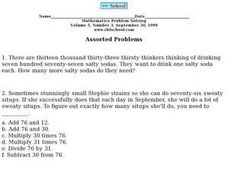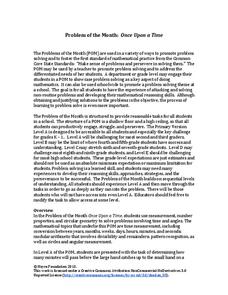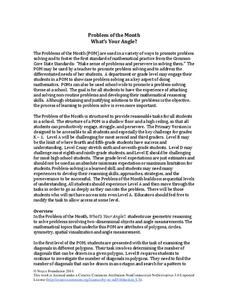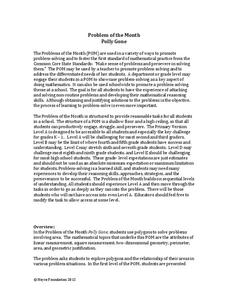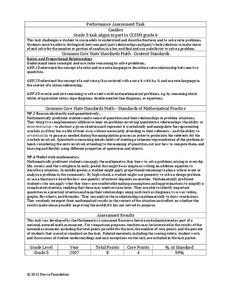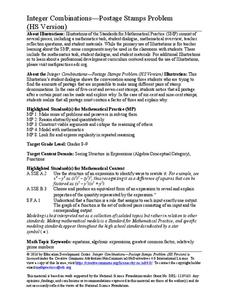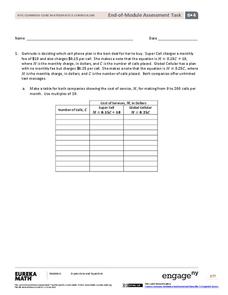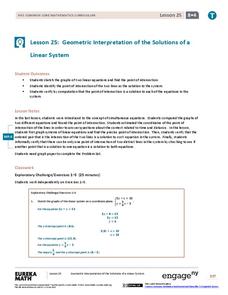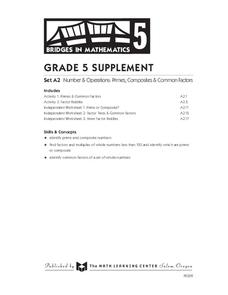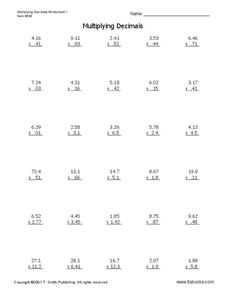Curated OER
Assorted Problems (Word Problem Solving)
In this math worksheet, students solve 4 story problems. Some of the numbers are written in word form. Students use basic operations including averaging.
Noyce Foundation
Cut It Out
Explore the mathematics of the paper snowflake! During the five lessons progressing in complexity from K through 12, pupils use spatial geometry to make predictions. Scholars consider a folded piece of paper with shapes cut out....
Noyce Foundation
Lyle's Triangles
Try five problems on triangles. Levels A and B focus on shapes that can be created from right triangles. Level C touches upon the relationship between the area of a six-pointed star and the area of each triangle of which it is composed....
Noyce Foundation
Diminishing Return
Challenge individuals to compete as many tasks as possible. Lower-level tasks have pupils apply costs and rates to solve problems. Upper-level tasks add algebraic reasoning and conditional probability to the tasks.
Noyce Foundation
Once Upon a Time
Examine the relationship between time and geometry. A series of five lessons provides a grade-appropriate problem from elementary through high school. Each problem asks learners to compare the movement of the hands on a clock to an angle...
Noyce Foundation
Digging Dinosaurs
Build a function to solve problems rooted in archeology. A comprehensive set of five lessons presents problems requiring individuals to use functions. The initial lesson asks learners to find the possible number of dinosaurs from a...
Noyce Foundation
The Shape of Things
Investigate the attributes of polygons. A thorough set of lessons presents problem scenarios for elementary through high school classes. The first lessons focus on basic characteristics of polygons, including the line of symmetry. As the...
Noyce Foundation
Miles of Tiles
Create number sentences and equations to solve geometric problems. Each activity in the series of five asks young mathematicians to consider different-sized tiles to build structures according to specific criteria. The first activities,...
Noyce Foundation
Surrounded and Covered
What effect does changing the perimeter have on the area of a figure? The five problems in the resource explore this question at various grade levels. Elementary problems focus on the perimeter of rectangles and irregular figures with...
Noyce Foundation
What's Your Angle?
Math can be a work of art! Reach your artistic pupils as they explore angle measures. A creative set of five problems of varying levels has young learners study interior and exterior angle measures of polygons. The introductory levels...
Noyce Foundation
Poly-Gone
Investigate polygons from rectangles to triangles to octagons. Each level of the five-problem series targets a different grade level. Beginning with the level A problem, learners examine the relationship between area and perimeter by...
Noyce Foundation
Double Down
Double the dog ears, double the fun. Five problems provide increasing challenges with non-linear growth. Topics include dog ears, family trees and population data, and geometric patterns.
Noyce Foundation
Candy Fractions
While examining fractions and ratios, your leaners get to read about one of their favorite subjects: candy! There are four word problems on this activity. Learners consider situations in which "for every x caramels there are y...
EngageNY
From Ratio Tables to Equations Using the Value of a Ratio
Use the value of a ratio to set up equations. The teacher leads a discussion on determining equations from ratio tables in the 13th portion of a 29-part series. Pupils determine which of two equations to use to find the solution....
Education Development Center
Integer Combinations—Postage Stamps Problem (HS Version)
It seems the post office has run out of stamps! Learners build all the values of postage available if the post office only sells five- and seven-cent stamps. The task provides an opportunity to create an expression in two variables and...
Education Development Center
Choosing Samples
What makes a good sample? Your classes collaborate to answer this question through a task involving areas of rectangles. Given a set of 100 rectangles, they sample a set of five rectangles to estimate the average area of the figures. The...
Education Development Center
Word Problem with Rational Numbers—Balancing Bars of Soap
Here's a resource teachers won't want to wash their hands of. Given a task where a full bar of soap is on one side of a balance and 3/4 of a bar of soup and a 3/4-ounce weight is on the other side, young mathematicians must determine the...
Curated OER
Unit VI: Worksheet 1 - Constant Force/Gravitational Force
Seven problems regarding gravitational pull are presented in this physics drill. Pupils solve for displacement, time, speed, and acceleration. Critical thinking and problem solving skills are both required to complete the assignment.
EngageNY
End-of-Module Assessment Task: Grade 6 Math Module 4
Finish out the module with a bang. The last installment of a 36-part module is an end-of-module assessment task. Test takers set up equations to represent relationships and solve problems in an assortment of contexts.
Curated OER
Modeling: Having Kittens
Cats can't add, but they do multiply! Determine the number of descendants of a single cat given specific facts about cats and kittens. The lesson focuses on developing strategies for problem solving using both individual and group work....
EngageNY
Geometric Interpretations of the Solutions of a Linear System
An intersection is more than just the point where lines intersect; explain this and the meaning of the intersection to your class. The 26th segment in a 33-part series uses graphing to solve systems of equations. Pupils graph linear...
EngageNY
End-of-Module Assessment Task: Pre-Calculus Module 4
Challenge your scholars to show what they know about the Law of Sines, Law of Cosines, and inverses. The six-question assessment is the last in a series of 16. Pupils find the area of triangles and show that the Law of Sines and Law of...
Math Learning Center
Grade 5 Supplement Set A2 – Number and Operations: Primes, Composites and Common Factors
Incorporate riddles into your math lesson by having students make tree factors and determine if the number is a prime or composite. They will also use other clues to find the answer to the riddle while sharpening their...
Curated OER
Multiply Decimals
Learners problem solve and calculate the answers to thirty mathematical multiplication equations. They must show each step of their work.
